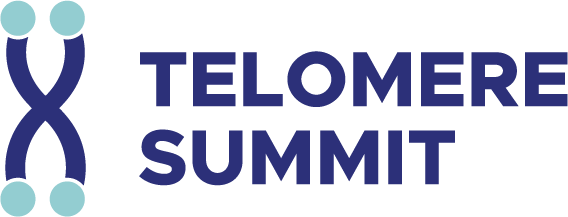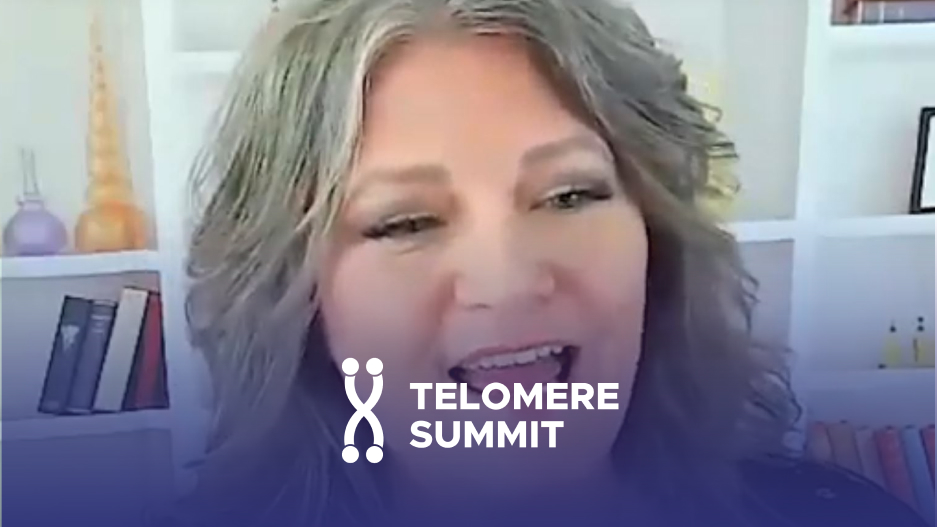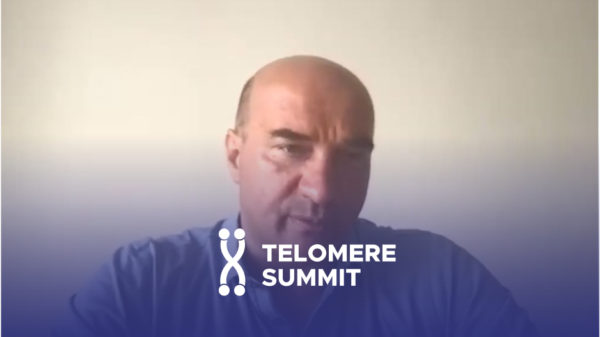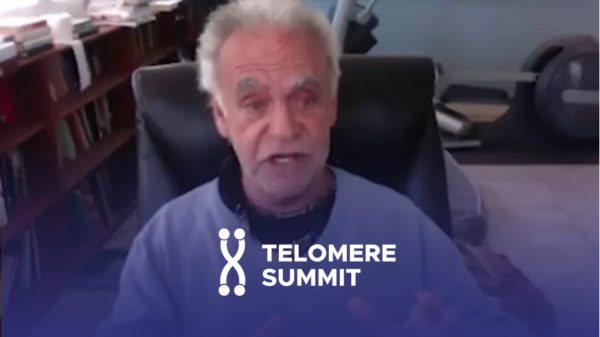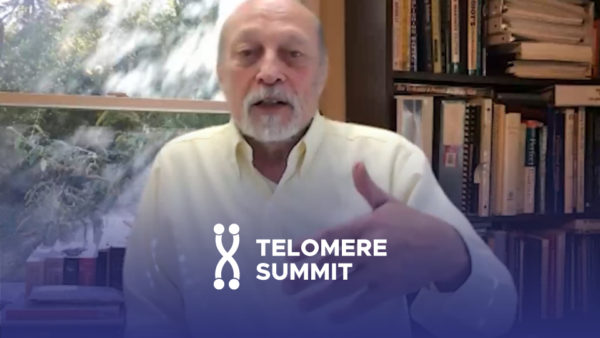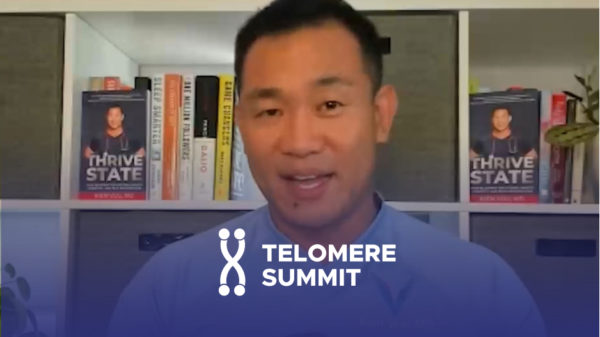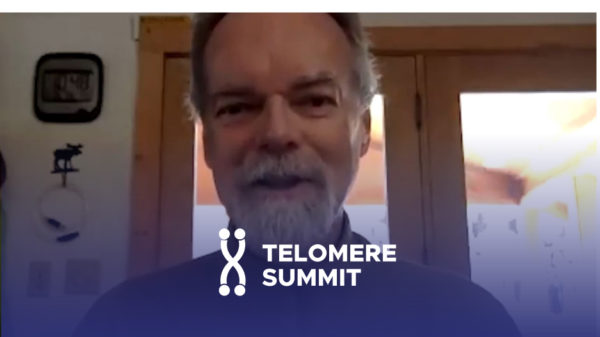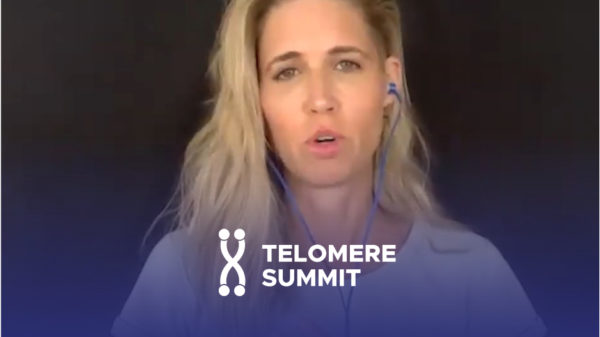Join the discussion below
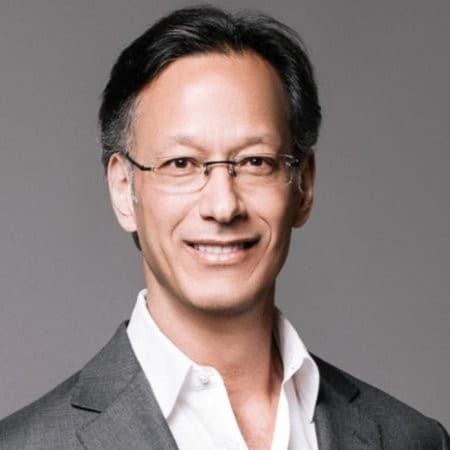
Dr. Raffaele received his B.A. in philosophy from Princeton University and his M.D. from Drexel University Medical School in 1989. He trained at The New York Hospital/Cornell University Medical Center and was formerly a clinical assistant professor of medicine at Dartmouth Medical School. Dr. Raffaele is board certified in internal... Read More
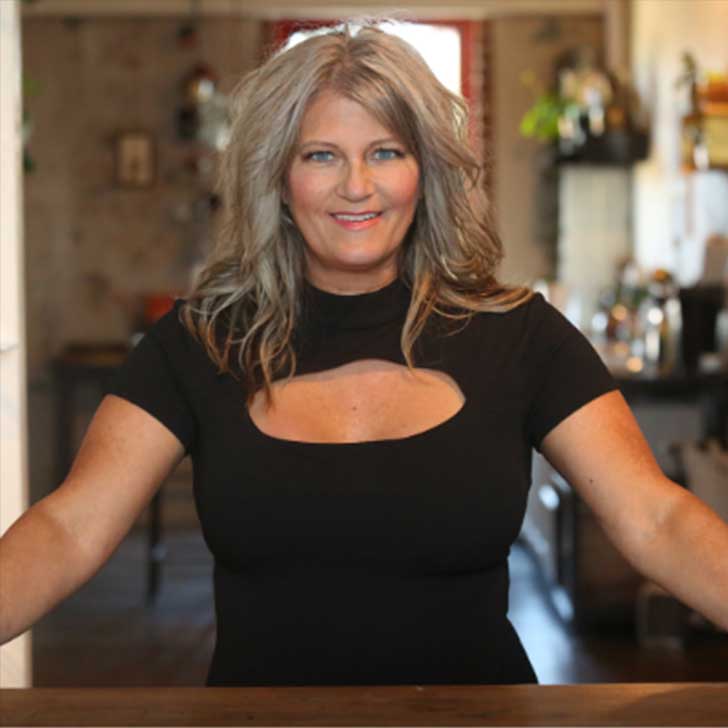
Angie Ates has over 21 years in Corporate Executive Leadership and was the #1 District Manager with Mimi Maternity and led teams with companies like Gap, Children’s Place and Fashion Bug, responsible for over $40 million in annual revenue. Read More
- 4 Pillars for effective treatment success,
- Redefining stress and the mind-body relationship.
- Using indigenous tools for authentic result.
Joseph M. Raffaele, M.D.
Welcome to the Telomere Summit again. I’m Dr. Joseph Raffaele, your host. I’m very happy to have Angie Ates on today to talk about the business of functional health and her journey from corporate health into indigenous health and a sane pathway towards healing. She is an internationally recognized speaker on the business of integrative functional health, helping practitioners attain multiple six-figure incomes while living their purpose. She specifically helps those in the healing arts who integrate holistic disciplines with passion, purpose, and profit, the trilogy model of a successful integrative practitioner. Her bio is quite extensive, but I’m gonna let Angie tell us a little bit about her journey, and then we’ll get into learning more about what she does and how it can help us in our practices.
Angie Ates
Perfect, thank you, Joe. My journey definitely has been a journey, and I think most of us in the healing arts can say we got into it for some reason, and the path sent us to the right, like I always say, a right turn at Albuquerque, then we made a left turn someplace else, and then we’re where we are, right? Ultimately, we all have a purpose, and my purpose is really to empower and equip the clinician. So whether that is a licensed clinician, unlicensed clinician, it all works together in integrative medicine.
Because, as we know, the best of all the worlds are really is what our client or our patient’s looking for. So I train the SANE Approach, which I know we’re gonna get into in just a little bit. My journey started like most people. I was in corporate America, whoo, 20 years in that rat race, right, in executive leadership. So I took teams to the top of their game and succession planning, and looked at numbers and all that fun stuff. And I loved it. My brain’s wired that way. I love to look at metrics and how we’re gonna reach them, and really grow the person to expand them so they can meet that metric. And then as the God has it, I’m brought to my knees and had my first autoimmune diagnosis. Not fun.
Joseph M. Raffaele, M.D.
No, that’s not.
Angie Ates
At all.
Joseph M. Raffaele, M.D.
A silver lining, sounds like.
Angie Ates
Right, then definitely. So I experienced multiple autoimmune diagnoses over the period of time, used lots of different methods, and finally realized, you look in the mirror and you say, I own this. A pill for an ill isn’t gonna work; I own this. And that really began my journey of healing me and taking ownership of my lifestyle, and my eating, and what went in my mind, what was surrounding. You know, we talk about epigenetics, and all those components. So I totally shifted my life. I left the rat race of corporate America and began on the natural health trail. And that’s where I am today. And I love it.
Joseph M. Raffaele, M.D.
Wow, that’s, yeah, I mean, it often is those kinds of life-changing events, illnesses, or losses of loved ones that make us look at our lives and say, why are we on this path, and perhaps there’s a better path. I had a car accident myself; it led me into medicine. So let me ask you about this methodology that you have. What exactly is the SANE Approach, besides being a great acronym, and how does one utilize that in their clinical practice of whatever type to help their clients achieve better health?
Angie Ates
Absolutely, so the SANE Approach is an acronym for Supplements, Ancillary, Nutrition, and Emotions. So what I found with over 5,000 clients that I’ve worked with over the years is that when we hit all four pillars, like hittin’ all the cylinders on a car, we really get those effective results. And we’ve gone through, in medicine, we’ve gone through a total indigenous, you know, don’t take a pharmaceutical, into pharmaceutical wins everything, into wait a minute, pharmaceutical has side effects, into wait a minute, right? So we’ve gone through this path of, what do we do? And now we’re really into that integrative functional aspect of let’s take a deeper dive of underneath what’s causing, the root cause, right, root cause differential. We talk about it every day, and this is no different. So the SANE Approach is that roadmap for the clinician to understand what’s the supplement purpose. So we have also gone down that path of a pill for an ill, right? So the folks have gone through, I don’t want a pharmaceutical, so they get 18 natural medicines, right?
Joseph M. Raffaele, M.D.
Right, that’s exactly, it’s kind of an irony there. Yeah, it’s still a pill for an ill. You just don’t need a prescription for it.
Angie Ates
Right, exactly, and then what happens, it overburdens the liver just like some of your pharmaceuticals, so we really didn’t win, right? And so we come out of that and we look at these supplements as, why are we using them? Like, what is the purpose of astragalus and telomeres? We know what the purpose is, right? It’s a spleen lover. We know it activates and lengthens the telomeres. We know what astragalus is gonna be used for. So but we also wanna dig underneath and go, why is it that we need astragalus? So we look at supplements as the purpose of it.
So is there a pathogen, is there a detoxification, like too many toxins in the world, in the body as a whole? Is this an emotional issue? What is our root cause? Where’s this coming from? I always say I look at pH, I look at toxins, I look at nutrient deficiencies. Like, where are we at here? So the supplements, we have a purpose. So why are we taking them, when do we expect to have a result? So how are we gonna know that something’s working here, right, something has to move to happen. And then we go on to the ancillary. So what does that look like? So ancillary is where we are collaborative partners. So the day of us doing it on our own I believe is out.
Joseph M. Raffaele, M.D.
Yeah.
Angie Ates
It is.
Joseph M. Raffaele, M.D.
It never should’ve have started, really.
Angie Ates
Right, right. A lot of organizations and individuals made what I call islands, and now they’re sittin’ in the middle of a moat-
Joseph M. Raffaele, M.D.
Right, exactly.
Angie Ates
By themselves, right? And it takes all of us, all of our genius to come together to really serve the client and the patient. So we look at ancillary. So let’s just say we’re working on detoxification. Well, we’re gonna support detoxification with maybe massage, lymphatic massage, or we’re gonna do chiropractic care or acupuncture or something like that. So that’s ancillary. And then we look at nutrition, and there’s all kinds of rules on nutrition. Eat this, don’t eat that. Oh, my gosh, that’s gonna kill you. Oh, no, everyone can have this, right? All these rules. So when we look at nutrition, we look at what do we need to take away? The pot of coffee needs to go. At the same time, Joe, as you know, if you’re taking a pot of coffee away from your patient, no one’s gonna want to be around them.
Joseph M. Raffaele, M.D.
That’s right, or they’ll be asleep.
Angie Ates
Exactly, right? So then what we look at nutrition, we say, okay, what do we need to take away or partly take away, what do we need to add as a substitution, and then what do we need to neutralize? Because they’re not gonna give up their one cup of coffee a day. They’re not going to. Then don’t make ’em, right? Don’t make ’em. And so we look at that and you customize it. Because, kale isn’t great for everyone, right? We know that, so we have to really customize that. And then we move into the E for emotions. And this is where, as we were talking earlier, this is where it’s really coming in heavy right now in our world as of this recording, is this emotional trigger behavior, this indigenous, ancestral, generational emotions-are-stuck.
Alexander Loyd’s new book, “The Memory Code,” I’ll do a shameless plug but, and he talks about memories being stuck, right? I mean, this is where we’re coming to. That’s the emotional pillar. And so it’s time for all of those emotions that we stuff because boys don’t cry and girls don’t do this, we have to start addressing that. And that’s the emotion column. And again, whatever modally, whatever collaboration, maybe you’re using healing code, emotion code, tapping, I mean, there’s lots of ways to fill that pillar, but it’s really either a collaboration or you do it yourself, whatever your business model is. So that’s it in a nutshell.
Joseph M. Raffaele, M.D.
So it sounds like, in some ways, it’s similar to the approach that was talked about a lot but wasn’t done, sort of the bio-psycho-social model, where you’re looking at all aspects. And now we have molecular pathways for showing why those actually are linked. I mean, we talked earlier about the link between telomeres and stress that Elissa Epel has done a number of good studies on, and we now know that epigenetics is affected by the outside world, not only what you experience but what you put in your mouth or don’t put it in your mouth, how you move your body or don’t move your body, what toxins and exposures from infectious agents that you have. And so, yeah, I mean, we’re, I think, looking at more of a model of this massive cells and emotion moving around is interacting with this environment, and that’s what we call people that are in need of help at times.
And so your approach is, I think it absolutely makes sense, you use it sort of more specifically in, are you a practitioner as well? Or are you more of a coach now or, and how do you implement it sort of in a more practical way within an integrative or a practice even like mine, a longevity medicine practice, which I should say parenthetically, people always ask me, what kind of doctor are you? ‘Cause they know I trained in internal medicine, allopathic medicine, but I’ve been doing medicine in this field that was called anti-aging medicine or whatever. And they say sometimes that you’re an integrative medicine doctor, and I say, no, I’m not an integrative medicine doctor. But now I’m thinking that I actually am because all these fields are becoming closer and closer together. And so they started looking at it from different angles, but the pathways are all converging. We’re getting science that connects them all. So in sort of a more practical way within an integrative practice or even a longevity practice like mine, or even hopefully someday in a primary care practice, what kinds of pearls and ways of implementing do you teach?
Angie Ates
Yeah, so I’ll start off, I have had multiple six-figure integrative practices with nurse practitioners, MDs, chiros, et cetera. I stepped out of that arena a few years ago and began an online training organization. I saw a gap in the distance learning unlicensed role and where everyone’s a health coach but they know nothing. And so I’ll be honest, it was a trigger for me. I’m like, seriously, you have someone’s life in your hands. I mean, you gotta have more than this, right? You gotta deep dive here. This isn’t gonna work. So I’ve worked with over 5,000 clients in my career. I mentor and consult, to answer those questions specifically, with licensed and unlicensed professionals, creating integrative clinics. So it’s about the business and how to implement it. And I love to do that, so-
Joseph M. Raffaele, M.D.
You help them how to be successful in practice, deliver good healthcare, make their clients, but it would also not be burned out, make money, which nothing wrong with that, it’s a business, and put it all together in a way that works for everybody.
Angie Ates
You got it. It’s my favorite thing to do, because after 20 years in corporate America, I’m all about those systems, right? So my brain thinks automation systems was still a love touch because your patient wants love, right? I mean, that’s why they’re coming to you. They want more than three minutes, right? I mean, that’s the reality.
Joseph M. Raffaele, M.D.
Sure.
Angie Ates
And so I like to pull all that together. Where’s the genius zone of the doctor, and then where’s the burnout mark. Because it’s something, you get your CEUs on watching a burnout video, right? And you’re like, I’m already burnt out. What are you talking about? There was really no, the shoulda’s don’t work.
Joseph M. Raffaele, M.D.
That’s just fuel to the fire, the burnout fire there.
Angie Ates
Exactly, so I love doing that. So how you can implement the SANE Approach in all spectrums is a couple ways. I was working with an ob-gyn and we created a true health coaching program. She’s about a six-month wait. So the first 90 days you’re working with lifestyle, basically, lifestyle coaching, health coaching, again, using the SANE Approach. What do we need to move out? What do we need to add in? And then when you get to her, we call it the warm-up band for 90 days, and then you get to the band, right? And then she’s able then to carry her profession, she is into fertility, that’s what she does, and she’s ready. Her client, her patient’s now ready for fertility, versus going through three or four or five months of trying to say you need to drink water and get off diet whatever, right?
Joseph M. Raffaele, M.D.
Right.
Angie Ates
So that’s how you can implement it. You can use a practitioner that’s been trained in this approach as your warm-up band to prep for you to get ready. Another way, if you’re not using that, let’s say you’re a solo practice or just a couple in your office, you can still implement it by, and this is something we work on, doing some videos that have to do with this. So your patient then is watching some training videos. I say that loosely; they’re not getting a certification, right? They’re being educated, for them to understand this is our approach, and we want to hit all four pillars, but we need to know buy-in, right. We need to know what are they willing to do and what can they do, and where is there a gap that you need to put somebody in to help them get to that Point A to Point B.
Joseph M. Raffaele, M.D.
Yeah.
Angie Ates
So it can be implemented many ways.
Joseph M. Raffaele, M.D.
Yeah, I mean, I was just thinking as you were saying that, I did an initial consultation this morning, and I loved a lot of aspects of that. I love seeing new patients ’cause they’re always interesting, sort of to learn about them as people, but also the puzzle of what’s going on with them and how to help them get to the goals. First thing I ask them is what their goals are. But I found myself thinking the thing that I don’t love about it is saying the same thing over and over again, that they, I mean, I should make a video that they see first or have them meet with somebody in my practice that said, “This is the Raffaele medical approach to this. “This is what he’s gonna be talking about,” and then I don’t have to go through that and they can use my years of experience for the tough questions and putting together the plan for them.
So I think that really is a major burnout, that aspect where you’re just mouthing this. I find myself talking even faster than I already talk, but I’m doing this ’cause I just wanna get it out. So I think that’s a great idea and I’m actually gonna start doing that. I thought about it, but now that you reinforced it, I think it really is one of the things that makes someone feel burned out.
Angie Ates
And it does, and we call that leveraging your genius, is what we call it in my consulting that I work with. Because where are you, right? I mean, you’re experienced, you’ve got genius, you’ve got years of wisdom. Why am I having you have a conversation about, did you drink water today and did you XYZ, right, whatever your field of medicine is. And that’s really what we’re looking at is how can we leverage your genius to make it more adaptable to your business model? So you use that support in a true support way.
So even if you integrate it, and we call it onboarding, so you have a client onboarding, here’s what to expect, watch this five-minute video, watch this one. We’ll come back, touch base, watch this and watch this one. And so it hits those pillars or those core belief systems or systems that you use in your business, and you’re not repeating it. It’s valuable. I encourage you to use it. You’ll be amazed of how you’re like, oh, wow, they actually remembered.
Joseph M. Raffaele, M.D.
Yeah, I mean, I’m just thinking that, as with many people in my field, a lot of my patients, they’re not coming to me because they’re necessarily sick, I mean, I’m a longevity practitioner, and they’re busy people. How do we get them to take the time to look at those videos and to read that material. I mean, we used to send out a guide to what we do, and we still send that out. I don’t know how much it gets read. And when I sometimes talk to them, I don’t necessarily know that they read it. Is there any kind of tricks to making sure that they look at this stuff, besides saying you gotta take a test before you come in to show that you’ve read this or watched this video?
Angie Ates
Yeah, it can be totally part of the onboarding. So are you doing it distance or are you doing it in person for your visits, your consultation?
Joseph M. Raffaele, M.D.
Until the pandemic, the initial consultation was typically in person. I’m doing some Zoom calls now. They have to come in to get blood tests done and we do other biomarkers, aging and other diagnostic tests that have to be done in person. So there is contact with the clinic typically at least once. I may be seeing them in person or I may be doing a Zoom call. But there should be some time to have a personal interaction with some member of my staff before they talk to me.
Angie Ates
Right, so then that’s how you want to integrate it. So you wanna put it into that here, before your first visit, or even during. Let’s say we’re doing a consultation, this is our overview. And you can screen-share a five-minute video, so you don’t have to hear me talk so fast. Here it is, and then you’re back in five minutes and then you carry on.
Joseph M. Raffaele, M.D.
Okay, great.
Angie Ates
You can do a hybrid of it. We’ve done it all kinds of different ways in clinics.
Joseph M. Raffaele, M.D.
Yeah, I bet it works really well there. I mean, it’s a funny thing. When you’re in person with somebody, they tend to be more, they feel like they have to be focused on you. When I was doing the Zoom call, when I was telling, explaining some of this stuff, which I thought he needed to know, I could see that he was maybe looking around on the Zoom call, and it was a little disconcerting to me. And he ended up being very happy and a nice guy. But so yeah, I think you’re right. You’ve gotta engage them. Otherwise, you’re gonna lose ’em.
Angie Ates
Right, you know, something we do, too, depending on how we create your signature program with the practitioners I’m working with, we even do a weekly Friday video on a topic. So let’s just say there’s five topics that you’re going to address. Now whether they watch the video, who knows. You record it once, it’s automated, sent out. And it’s a five-minute, three-minute on water. It’s a three-minute on whatever pertains to what you’re doing in your practice. And this also just gets that touch, right, that touch back to them, so they don’t think that you have forgotten them, especially in the world of Zoom, right? Sometimes we just want that touch. We just want to know that this wasn’t a three-minute visit. You know?
Joseph M. Raffaele, M.D.
Right, yeah, absolutely true. So your work has sort of, I mean, I’m most curious sort of about the emotional part of it and what kind of stuff that you do. You’re a shaman, or is that, shah-man or shay-man? I always get that wrong.
Angie Ates
Shaman, shaman.
Joseph M. Raffaele, M.D.
Shaman. And that’s obviously come into real vogue now these days where people are understanding how important the emotional state is and the use of some of these psychedelics and other things in that realm. But I guess sort of getting down to, getting back to the indigenous, tell me a little bit more about that.
Angie Ates
Yeah, so I went through a four-year program to become a full mesa shaman. I had multiple teachers. It’s a process. Yes, I participated in psychedelics. I do not encourage that unless you’re in a very safe environment, because it gets a little weird, it truly does. For me, it was one of the major healing pivots of my autoimmune disease. I’ll just be really honest. Getting the mind out of the way and going deep into the root was one of the best things I could have done. And it was beneficial. So you just wanna make sure you’re with someone that’s trusted and it’s safe. But there are other ways to move through your crap, for the lack of better words, right?
We all have it, whether we understand it or not. We all had childhood trauma, we all had adult trauma. We all had trauma when we went to the drive-through at the bank. I mean, we all had trauma. And I laugh because we all have had it, and we just need to really just, we’ve had it. And so using processes the indigenous way, we like to do journeys, we like to do guided meditations. We work through clearing different energy fields. We work on soul retrieval. I mean, we work on many different aspects to really get into that emotional, mental, body aspect and say, where is this coming from? Most indigenous shamans when we work, my heritage is Cherokee. So when we work in the shamanic world of healing, there’s also a concept of past lives, with the belief that the soul has reincarnated to expand into this life. And many Christians and other religions don’t believe that, so you don’t have to participate in that aspect of it to still get benefit of healing the emotions that you dumped when you were three years old into the spleen.
Joseph M. Raffaele, M.D.
Right, exactly.
Angie Ates
And there it hangs, right? Or fear in the kidney. I mean, there’s a lot of science. I mean, gosh, Dr. Lipton and Dispenza, and I mean, all of ’em have been around a long time telling us, ♪ Hello ♪ There’s-
Joseph M. Raffaele, M.D.
Not to mention Jung, right, yeah. Yeah, I always like to say the unconscious always gets even. If a little child is injured, they’re not gonna let you forget.
Angie Ates
Right, right, well, it will show up somehow, whatever that is. So whether you use indigenous methods or using, like I said, there’s tapping, there’s so many other modalities out there. The key is to really, especially right now, to recognize that we are being asked to change the dynamics of our family. We’re being asked to recognize those emotions, and those triggers and those traumas, and to begin to heal them. And it even goes back in the generational aspect. And when I’m working with practitioners, I’ve trained over 10,000, internationally, practitioners and spoke on a lot of stages, I always speak and say, if you got your mama’s nose, there was emotion that came with that nose.
There’s more than genetic pieces of methylation and this and that, and all that science, and I get it and it’s true, but there’s also an emotional piece. There’s emotions trapped into that size of your nose or whatever the case may be. And so going back to that DNA, and I’m coming from a shamanic view, going back to that DNA and going into that cell, and is there something to clear from that generational you-got-your-mama’s-nose or your dad’s legs, you know, is there something there that we can heal that’s been trapped and carried on through the generations. And this is the time.
We’re really being called to do that in a universal energy. If we get into energy medicine, we’re really being called that in alignment that it’s time to, the buck stops here. It’s time for us to look in the mirror, take ownership of our health, and quit thinking pill for an ill, and really recognize we all have gone through trauma. Like, let’s move through it. Let’s begin to heal it and quit complaining about it. That may be more than what you asked for, Joe.
Joseph M. Raffaele, M.D.
No, no, no, not at all. I mean, I’m just thinking, I think you’re right about what they’re asking. Do you have any thoughts about what that impetus of that is? Or is it what forces have come together, cultural or otherwise, to make us sort of focus on this kind of stuff.
Angie Ates
You know, astrology, if you study any astrology, and astronomy, but astrology, you really study it, there is an alignment and a shift energetically. I mean, you could go way off into dimensions and all kinds of stuff. But even if you study the Schumann Resonance, I mean, it’s changing, it’s heightened, we’re getting flares in the air, as I call them. I mean, there’s just a lot of just breaking point. We are being shifted energetically to a breaking point to either choose left or right. There’s a fork in the road. And we truly have an opportunity as a society and as human race to say, I’m ready to heal all the trauma and all the everything, and live a different life that really is manifesting and really is living our purpose.
You know, I think for so long that we’ve all just done the job, because we’ve done the job, that we’re really being called to what’s your heart wanna do. And, you know, it goes back to what I do with practitioners. What do you really want to do? I mean, not what your dad did and his dad did. What do you really want to do? So let’s make that a sustainable practice, living your purpose, because your passion’s gonna fuel that, but you gotta bring in income, right, we talked about that a few minutes ago, and really hit that purpose, passion and profit. So what’s happening right now is that the universe, literally astrology, if you study it, is saying, we’re shifting you; you have a couple choices here. Feel the pain and exit or push through this and begin to heal the human race.
Joseph M. Raffaele, M.D.
Yeah, I mean, I think there is really something interesting going on. Certainly in medicine, we’re changing in a number of different ways, and the paradigm is shifting from disease to, not the term wellness. I like to think of it as sort of optimal health, the way in which the World Health Organization defines it, which some people think is overly expansive, but really it isn’t, a total physical, social, and mental well-being. And you really can’t have any of those unless the other ones are working as well.
And then that has to be aligned with what you’re doing with yourself and your life, the purpose part of it. In a more sort of, again, a little bit more, I’m curious, you’ve mentioned a lot of different techniques, what indigenous tools you have. I mean, I’m sure you have experience with all of them, but which do you particularly like, and for what reasons and what sort of indications, and how might one integrate them into their practice?
Angie Ates
Yeah, so one of my favorite is the inner child work. So really going back to that inner child, the child that still wants to come out and play, but we’ve been taught through society you don’t laugh, you don’t smile. You know, we’re all stone-faced, right, because that’s our protection. It goes back to our heart wall, you know, that unconditional love hasn’t been there. I love going into the inner child and really coming out to play. And when we do some of our guided meditations, I can take you back to that inner child and we can go, wow, that’s where that hip pain’s coming from, right, the right side hip pain. You’re not moving forward in life. Your inner child’s still stuck. So let’s begin to heal that.
Let’s do a ceremony around that and let’s begin to heal that. And you’ll see a shift, you’ll see a physical change in the body usually within three, 30 days max, typically 72 hours. And then the second one is soul retrieval. Anything to do with the soul work. I love the retrieval. I love going in to find out when your soul decided, a part of it, a splinter of it, decided to dart. It could have been during a molestation experience.
It could have been during some bullying when you were in third grade. It could be any of that. And it doesn’t mean the soul left you. I mean, that’s not what it is. But there was a part of it that said, “Oh, hell, no,” “I am outa here. “I’m goin’ for safety,” right? And so we go back to that experience, this trauma, that’s why it did it. And we go back to that right before it happens, and we take you visually to that experience, and we begin to change and heal that. And then we bring it all the way to our current experience, and then we have a ceremony. It’s an actual process that we have a conversation with that piece that left, and you get to know that piece. And then you realize, wow, that was the piece that I used to have joy and laughter with, and I don’t have joy and laughter any more.
Wow, it comes back. And there’s a ceremony to it. And again, within about 30 days of that experience, you find that you laugh at more things, and you just see more joy instead of the anger or frustration or whatever the dense energy that you might be experiencing. There’s a whole lot more, but those two are the ones I get the best results with.
Joseph M. Raffaele, M.D.
Yeah, I mean, I think that that is something that most patients could use, but how do you, like I’m not a therapist or a, obviously, when I practiced internal medicine for awhile, pretty much 30, 40% of what I did was therapy. But how would you integrate that? I mean, I remember a patient sitting across from me telling me about how he was buried in ice and snow up to his neck by somebody who was bullying him, and he had night terrors for the last 40 years of his life. I mean, I can’t address, I mean, are there sort of, besides sending him to a psychiatrist, a psychotherapist, are there other ancillary resources that one might use for that?
Angie Ates
Absolutely, so you wanna find someone like myself, and I have a group of individuals that can actually offer that service remotely for them. And so they can offer the shamanic services via Zoom, via phone, whatever methods, and then we’re able to go and do those processes with them. Um-hum.
Joseph M. Raffaele, M.D.
That’s great, yeah. I mean, if you talk to patients, exactly what you’re saying, they’ve all had traumas. And, again, trauma doesn’t have to be something that is appalling. It can be relatively minor and do a lot of damage. And none of it should be thought that it’s less than, so to speak, because it just depends on what stage of development you’re in and whether you can handle it or not. So it’s probably the kind of work that everybody should do, because, as you say, everybody has their traumas. And actually these days, a lot of people are doin’ it now. But, well, that’s very interesting.
I mean, I think that’s the kind of thing that we used to think was sort of soft in medicine, I know certainly in allopathic medicine, but now with these connections to epigenetics and molecular biology of telomeres and the bioenergetics linking to all these things, it’s all coming together. It really is; it’s pretty fascinating. What else, what other kind of pearls would you have for somebody starting out, what would be the first things, what’s the top of the list of things that people have to, because I have a lot of doctors that come to me, well, how did you get to where you are? I have a full-time practice, I love what I do, I’m doing what I wanted to do. And they’re stuck with one foot in traditional medicine or they’re in a whole other field like you were, and they’re trying to transition over. What kinds of, I mean, you’ve been coaching lots of people to do this. What do you tell a person like that?
Angie Ates
The first thing I like to do is take them through a clarity process. Because at the end of the day, what does that really look like to you, right? I wanna do-
Joseph M. Raffaele, M.D.
What do you really wanna do.
Angie Ates
Right, right, I wanna do what you’re doing. Well, what is that? Like, how many hours a week? Do you want a staff? Do you wanna do it by yourself? How much income do you wanna earn, profit do you wanna earn? Like really go through that, what does it really look like? You walk through the door and, or you do it all online and; what is an onboarding process? So now that you’ve got clarity, the next step is, is how do I onboard my new patient? Like, what does that look like? Do I have a signature program? What’s included in that? And then you’ve gotta round that out. Like, what is this? And I always say, it’s better to be lean than all spread out, especially at the beginning. Because if not, you’re doing all these things, right, especially when it comes to marketing. You’re doing YouTube and Facebook, and this and that, and this and that, and you’re spread way too thin. Nobody knows anything, and you feel chaos because it is. Right?
Joseph M. Raffaele, M.D.
Right.
Angie Ates
And so it’s really, in our business academy, I train you on how to go through the three phases of business. And the first phase is just that, what does it look like? And then part of that’s doing a market survey. This is who I want, this is the niche, this is what I wanna do. Well, ask the people, what do they want? I mean, you’re assuming you know.
Joseph M. Raffaele, M.D.
Right. I mean, that’s so funny because when I first started, this was back in 1998, when I switched from internal medicine over, I knew that I didn’t wanna do internal medicine. I had done five years of it and it wasn’t lightin’ my fire, so that purpose was no longer there. But I was fascinated with aging in the body, and I was watching my parents get older. I was at a point in my life where I could just do a 180. And so I sorta did a build-it-and-they-will-come, and I didn’t do the market surveys. And we sat around and waited for the phones for quite a long time. And for people that have to have an income during that transition, that’s something that has to be thought about. I mean, I’ve been lucky in having people working with me who think about all these other things that I need to think about more myself.
But I mean, just hearing them from you, I can’t underemphasize how important, looking back, how important they really are, so that you don’t, I mean, look, I wasted probably a year, year and a half, and I had some fun. I was here in New York, single guy, but if you think about it, that was a lot of lost income and time that, if I had planned better, would have been done. So you, actually, you have services that are available now to do that. You wanna tell us how somebody might get in touch with somebody, get in touch with you, for those?
Angie Ates
Yeah, absolutely. So you would just send me an email. So it’s just [email protected]. So a-n-g-i-e-a-t-e-s dot com. And then we set up a time in which we have a discovery session, and then that allows me to know, can I help you? Do I have a partner that can help you better? Like what phase of business you’re in, what part you need me, what you don’t need me. Then once we do that, I put together a proposal and we decide this is what we need to do, when we do it, metrics, what your part is, what my part is, the whole nine yards. Again, coming from corporate America, running executive leadership, I have to look at the big picture, and then I drill it down on metrics and when we’re gonna hit them. So I’m very metric-driven. So if you’re a doctor or a practitioner that’s not metric-driven, I’m all about putting your feet to the fire. It’s about metrics.
Joseph M. Raffaele, M.D.
Great, yeah, I mean, that’s what needs to be done. This is what the plan is to get to here, then from there, what’s the next thing, and let’s meet those goals, which is something that is absolutely needed. Healthcare practitioners, doctors, et cetera, are not trained in business. I mean, that’s the unfortunate part of it. And moving into these more cash-pay fields, it’s one of those things where it’s great when patients, clients come to see you, they’re seeing you because they choose, with their economic power, to come see you. Nobody’s telling them you have to go there, you’re not forced to go there. So that’s great. But the other part of it is that you have to be receptive to what they want, and that has to match what you wanna give them. And you go through those kinds of things, absolutely do. And you also do the marketing and the other side of it as well.
Angie Ates
Yeah, we go over all of that and what needs to happen, what doesn’t need to happen. You know, some people are doing the basic DPC, so Direct Primary Care; some folks are doing memberships. Some are doing a hybrid. I’m working with a husband/wife medical team in Louisiana, and one is an ER doc. He’s about to get out of big box medicine and open an urgent care. The other is internal medicine, her focus is cardiology, so she’s now gonna get out of big box university medicine. And they’re gonna share a space. And so what I’m doing with her is she is integrative, so she understands the power, and we are deciding what machines and what activities she really needs to do in Phase one to bring in the income, still be able to provide the services. She’s gonna be DPC so, and she’s taking one insurance. So she’s taking a PPO, so a little bit of a dynamic there. And then what she needs for Phase two. So you can do integrative care, but does she really need to go and buy a far infrared sauna and this and that and whatever? Not yet.
Joseph M. Raffaele, M.D.
Yeah, I mean that’s, definitely. I mean, I make those decisions here in Manhattan where real estate is at a premium. I’d love to have an IV drip lounge, but it’s not gonna pay for itself.
Angie Ates
Right.
Joseph M. Raffaele, M.D.
And there’s people down the street that are doing it and they’ve got storefront real estate, and that doesn’t really leverage my expertise because it doesn’t take that much to do that. So yeah, you have to make those hard decisions and know your market, know who your potential customers are. So it sounds like that would be great. I should’ve met you 20 years or 25 years ago. Maybe I’d be retired by now.
Angie Ates
Yeah, well, I love doing it and I love that integration. So in your case, you’re gonna partner with the IV lab and say, hey, let’s collaborate.
Joseph M. Raffaele, M.D.
Right, yeah.
Angie Ates
Right? And let’s go back and forth. And there’s sometimes money involved. Sometimes it’s just free IVs. I mean, you can be so creative. And the market now, and I alluded to it earlier, folks are saying, okay, let’s collaborate.
Joseph M. Raffaele, M.D.
Right.
Angie Ates
It’s time to collaborate. Let’s create a trust between each other and let’s truly make this happen. And when you’re looking at the medical profession coming out of what I call the big box medicine into their own, they’re not entrepreneur-trained and that’s not where their genius is. So if you can create systems that allow them to shine their genius without responding to emails. You know what I’m saying?
Joseph M. Raffaele, M.D.
Yes.
Angie Ates
Then you have a win-win. And their passion, and they’re satisfied with what they’re doing, and it’s just a win-win for everybody, yeah.
Joseph M. Raffaele, M.D.
One thing just popped into my head. One of the difficult things right now is finding good personnel, good people that are trained in particularly the integrative field as well. I mean, just regular old nursing and MDs, certainly. But is there help you give in that?
Angie Ates
I do. So I personally, our company has an entire Filipino team that we have-
Joseph M. Raffaele, M.D.
Oh.
Angie Ates
Yeah, so we’ve established an ecosystem, a metrics, all the parts that need to matter, and then they work on U.S. hours. So they’re workin’ the night shift, per se, for them, but it’s U.S. hours for us. And then after that, depending on what the role is, I have contacts throughout the United States on where’s the need. Is it a remote need? Is it a on-site need? Like, what is the gap, where is the gap, and how can we leverage that for the best profit? ‘Cause you have a payroll percent to stay within, you have your genius, you have your marketing to bring in business. Like how can that person help with all that aspect? So when you’re hiring someone, they can’t be an expense. They have to pay themselves plus some. So how do we leverage that?
Joseph M. Raffaele, M.D.
That’s exactly right. Yeah, that’s not a good business model, the ones that are just an expense. Well, this has been really an eye-opener for me. I mean, I knew the services were sort of available, but sort of the details and how I can say truly that I would like to avail myself of them. I have a great person running my practice now and I’m gonna ask her to watch this video as well. Do you have any sort of parting words of wisdom, or anything more you’d like to say-
Angie Ates
I would just, yeah.
Joseph M. Raffaele, M.D.
On this interesting subject?
Angie Ates
Yeah, it is interesting. I wanna first say thank you for letting me come and what I like to say, play with your community ’cause I love it. I love really equipping and empowering folks. And anyone watching this, if you’re a practitioner and you’re ready to stand in your power and fill the gap of the soul, like you’re like, I want to do this and I’m ready, I’d just encourage you to shoot me an email and let’s connect to see if there’s some way I can guide you, and I have a massive network. Is there someone I can connect you with that could also help you. Because it’s time in our lives, regardless of age that you are, it’s time in your life and in our lives to stand in our purpose and really drive it with passion. We’re being called to do it, especially the DPC, the private practice model is, people pay.
So the fear of thinking, well, I don’t take insurance, they won’t pay, that’s an old fear. That’s not happening. Folks are demanding healthcare and they’re demanding quality healthcare, not the two-minute visit, but they’re demanding healthcare and folks will pay for it. And so I’d just encourage anyone that really is ready to stand in their power, someone that wants to integrate maybe even shamanism or that emotional piece, reach out and let me see how I connect my people with your people, and let’s just make it happen. It’s time, it’s really time for us to live our passion. And we deserve it.
Joseph M. Raffaele, M.D.
And I couldn’t agree with you more. Absolutely, I think that’s so true. People are willing to pay and they’re tired of the old model. And I thank you for giving your words of wisdom on this and thank you very much for being on the Telomere Summit.
Angie Ates
Absolutely, and you can always check our website out. We have that five-day challenge for that SANE Approach if you wanna do that SANE Approach. And those’ll be in the notes, I’m sure.
Joseph M. Raffaele, M.D.
Perfect, well, thank you again, Angie. It’s been a pleasure.
Angie Ates
All right, thank you, Joseph.
Joseph M. Raffaele, M.D.
I hope to meet you in person.
Angie Ates
Absolutely, thanks.
Joseph M. Raffaele, M.D.
Take care.
Angie Ates
Bye.
Downloads
